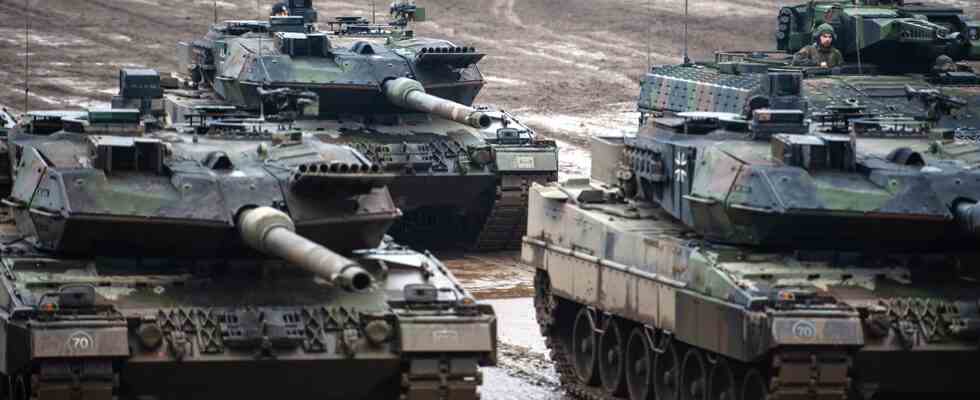Status: 09/17/2022 1:24 p.m
On the question of whether to deliver main battle tanks directly to Ukraine, Chancellor Scholz further ruled out Germany acting alone. CDU leader Merz criticizes this attitude. The Russian ambassador warns of further deliveries.
Deliver battle tanks directly to Ukraine – this demand has accompanied the Chancellor for days. Ukraine wants it just like parts of the traffic light coalition. But Olaf Scholz sticks to it: The federal government will not alone decide whether to deliver battle tanks to Ukraine. He emphasized that again Deutschlandfunk. “We will not go it alone in everything we do,” said the SPD politician.
Soviet-made battle tank
According to Scholz, Germany is already one of the most important arms suppliers to Ukraine. With the Panzerhaubitze 2000, the federal government has supplied the most modern device that is ever used in the war against the Russian attackers. “It was precisely the weapons that we made available that made the difference and also made the current successes that Ukraine has achieved possible,” said Scholz.
Neither the USA, Great Britain nor France supply western-style main battle tanks. Scholz pointed out that the federal government had ensured that Ukraine received Soviet-designed battle tanks through ring exchanges with the Czech Republic, Slovakia and Greece. The supply of Leopard tanks has been a contentious issue in the coalition of SPD, Greens and FDP for weeks.
Klingbeil: Reevaluate the question together every day
In the Reuters interview, SPD leader Lars Klingbeil also insisted on an international vote – but does not rule out a later delivery. “I believe that we have to reassess the issue together every day,” said Klingbeil when asked whether he had any fundamental reservations about the delivery of battle tanks to Ukraine if the partners agreed.
“The fact that the western alliance stands together, that we coordinate closely with the Americans, the French and the British, is of great value,” he added. “It is clear in the federal government that we are not going it alone on a national level.” Klingbeil added: “I want this support to continue, that we also look at what else we can deliver”.
On Thursday, the German government announced that it would deliver two more multiple rocket launchers and 50 Dingo armored vehicles to Ukraine. Federal Foreign Minister Annalena Baerbock had also insisted that the Western partners quickly agree on battle tanks.
Union faction wants to submit an application
The CDU chairman Friedrich Merz accused Scholz of listening to the wrong people in the SPD in the debate. “That’s why he’s refusing to give Ukraine the battle tanks it urgently needs,” Merz told the Frankfurter Allgemeine Sunday newspaper.
According to reports in the “Frankfurter Allgemeine Sonntagszeitung” and the “Spiegel” newspaper, the Union faction intends to submit a motion in the Bundestag in the coming week, with which it intends to expand arms aid for Ukraine.
Russian ambassador warns of deliveries
The Russian ambassador in Berlin, Sergey Nechayev, warned Germany against supplying more weapons to Ukraine. “The delivery of weapons is a way to a dead end. This prolongs the fighting. That brings additional victims,” Nechayev told the “Frankfurter Allgemeine Sonntagszeitung”.
However, he did not substantiate the possible delivery of Leopard-2 main battle tanks with concrete threats. “Real politics knows no subjunctive.”
Bundeswehr fears weakening
The German Bundeswehr Association, on the other hand, fears “cannibalization of the troops” if Germany supplies weapons and ammunition from Bundeswehr stocks. “We understand Ukraine’s desire for heavy weapons only too well. We can imagine, for example, handing over armored personnel carriers from the stocks of the industry,” said association head André Wüstner to the editorial network Germany.
“What we no longer see as a professional association, however, is the delivery of weapons and ammunition to the Bundeswehr. Every single delivery leads to a weakening of the Bundeswehr,” says Wüstner.

